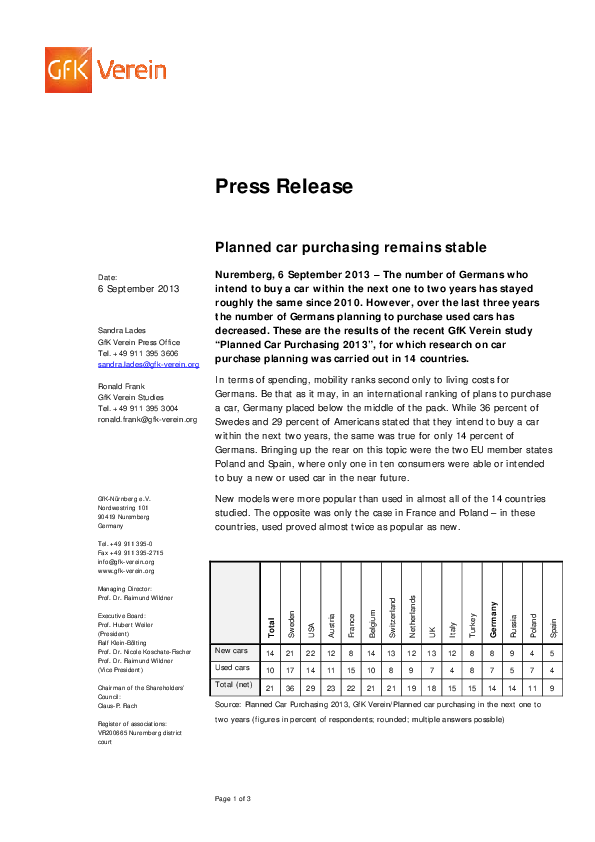Press
Planned car purchasing remains stable
The number of Germans who intend to buy a car within the next one to two years has stayed roughly the same since 2010. However, over the last three years the number of Germans planning to purchase used cars has decreased. These are the results of the recent GfK Verein study “Planned Car Purchasing 2013”, for which research on car purchase planning was carried out in 14 countries.
In terms of spending, mobility ranks second only to living costs for Germans. Be that as it may, in an international ranking of plans to purchase a car, Germany placed below the middle of the pack. While 36 percent of Swedes and 29 percent of Americans stated that they intend to buy a car within the next two years, the same was true for only 14 percent of Germans. Bringing up the rear on this topic were the two EU member states Poland and Spain, where only one in ten consumers were able or intended to buy a new or used car in the near future.
New models were more popular than used in almost all of the 14 countries studied. The opposite was only the case in France and Poland – in these countries, used proved almost twice as popular as new.
Germany: used cars currently less popular
Three years ago, Germans tended more often to buy used models: in 2010, 11 percent of Germans stated that they could see themselves behind the wheel of a used car in the next one to two years. By contrast, a new car was only in the pipeline for just under 7 percent.
The relationship between new and used has now evened out somewhat for Germans (new: 8 percent, used: 7 percent). However, figures for both kinds of planned purchases tended to increase in the 40-49 age group, as 11 percent and 10 percent had their sights set on new and used models respectively. Households with three or more inhabitants and households with children intended to buy a car with above-average frequency. Overall, 19 percent of responses were in the affirmative for both kinds of households.
On the other hand, the proportion of potential future car owners in large German towns with more than 100,000 inhabitants (11 percent) only amounted to just over half that of those in towns with fewer than 5,000 inhabitants (19 percent).
Slight increase in electric/hybrid driving technology
When it comes to power, the picture remains much the same as in 2010 for those with their sights set on new cars: petrol and diesel engines emerged victorious once again, with both at 3 percent. It seems as though cars with electric or hybrid engines are becoming somewhat more attractive to car purchasers. This is presumably a result of more choice on the market. Just 0.6 percent stated that they planned on such a purchase in the next one to two years back in 2010, compared with 1.2 percent now. Those considering these new alternatives were mainly high-earners from the 40-49 age bracket. Almost just as many respondents in this group planned on buying this kind of car (3.1 percent) as were opting instead for a petrol engine (3.8 percent).
About the study
These findings are an extract from the GfK “Planned Car Purchasing 2013” study and are based on around 15,600 consumer interviews which were carried out on behalf of the GfK Verein in spring 2013 in Austria, Belgium, France, Germany, Italy, the Netherlands, Poland, Russia, Spain, Sweden, Switzerland, Turkey, the UK and the USA.
About GfK Verein
The GfK Verein was established in 1934 as a non-profit organization for the promotion of market research. Its membership consists of approximately 600 companies and individuals. The purpose of the Verein is to develop innovative research methods in close cooperation with academic institutions, to promote the training and further education of market researchers, to observe the structures and developments in society, the economy and politics that play a key role in private consumption, and to research their effects on consumers. Survey results are made available to the membership free of charge. The GfK Verein is a shareholder in GfK SE.
Further information: www.nim.org
Twitter: GfK_Verein
facebook: GfK Verein
XING: GfK Verein
Responsible according to press laws:
GfK Verein, Press Office
Sandra Lades
Nordwestring 101
90419 Nuremberg
Germany
+49 911 95151989
sandra.lades@nim.org
